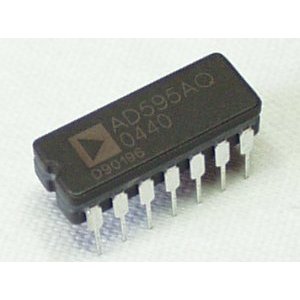Thermocouple Amplifier AD595-AQ
Analog Devices Thermocouple Type-K Amplifier. Attach a thermocouple, 5V power, and a decoupling capacitor and you've got 10mV/C output! Perfect for high temperature application. The 10mV/C analog output interfaces nicely with 10-bit ADCs found on many types of microcontrollers.
- +/- 3C Accuracy
- 10mV per degree C Output
- Laser Trimmed 250mV Output at 25C
- 5V-15V Power Supply
- Requires only a decoupling capacitor
Resources:
Thermocouple Amplifier AD595-AQ Product Help and Resources
Core Skill: Soldering
This skill defines how difficult the soldering is on a particular product. It might be a couple simple solder joints, or require special reflow tools.
Skill Level: Rookie - The number of pins increases, and you will have to determine polarity of components and some of the components might be a bit trickier or close together. You might need solder wick or flux.
See all skill levels
Core Skill: Programming
If a board needs code or communicates somehow, you're going to need to know how to program or interface with it. The programming skill is all about communication and code.
Skill Level: Rookie - You will need a better fundamental understand of what code is, and how it works. You will be using beginner-level software and development tools like Arduino. You will be dealing directly with code, but numerous examples and libraries are available. Sensors or shields will communicate with serial or TTL.
See all skill levels
Core Skill: Electrical Prototyping
If it requires power, you need to know how much, what all the pins do, and how to hook it up. You may need to reference datasheets, schematics, and know the ins and outs of electronics.
Skill Level: Competent - You will be required to reference a datasheet or schematic to know how to use a component. Your knowledge of a datasheet will only require basic features like power requirements, pinouts, or communications type. Also, you may need a power supply that?s greater than 12V or more than 1A worth of current.
See all skill levels
Comments
Looking for answers to technical questions?
We welcome your comments and suggestions below. However, if you are looking for solutions to technical questions please see our Technical Assistance page.
Customer Reviews
3 out of 5
Based on 1 ratings:
Good, for what it is.
Well, it's true: This chip interfaces nicely with the 10-bit ADC on things like Arduino. If you're working on a breadboard or soldering through-hole components, this might be your only option. And in all honesty, I wouldn't say it's a bad option. You can even build your Tweeting Turkey Temperature Timer Thing with it!
But if you have the capability of working with SMD components and SPI interfaces, do consider the MAX6675 option.
I have used the AD595-AQ in a project with an Arduino Pro Micro 5V.


Excuse the ignorance, but what solder/solder paste is used on the joint between type-k thermocouple wires and this chip?
Just so folks are aware, you CAN use this amplifier for other purposes. A type K thermocouple creates a voltage of around 41uV/C. So, looking at the specs given, we can do some math: (41uV x Temp) x gain = Output to ADC, so we can find that the gain is going to be around 243. So, if you need an amp that is relatively noise immune and operates at about A=250V/V, then this might be useful to you. For folks looking to save a little bit of money, you can also get instrumentation amplifiers for $5ish on the low side with adjustable gains.
Why is it that a K-Type thermocouple is the only one that will work? I would like to use a T-type thermoucouple as the uncertainty of the measurment is half as much as the uncertainty in the measurement of the K-Type.
I'm using this with an Arduino. With a multimeter, the voltage on the output pin looks fine (0.33V in my kitchen - it's hot here at the moment), but when I connect it to the Analog Input on the Arduino, the voltage jumps up to around 1.1 volt!? Any ideas why this might be?
I love this chip, I use it it read a thermocouple in a high temperature inductive heating/inductive plasma synthesis control system. It works really well, as long as care is taken for proper EMI shielding. The thermocouple heath status pin is an awesome feature. http://eat.nineburritos.info/design/hardware
from the looks of it, the AD8495 seems to be a MSOP replacement for this, as i couldn't find this in a SMD package...is this correct? On AD's page they say this chip should be considered for new devices, so I take that to mean it's a replacement for AD595.
I'm the person who created the CNC toaster oven linked to above. I migrated my site to google sites, and the toaster oven page has been moved to:
http://www.esmonde-white.com/home/diversions/cnc-toaster-oven
Thanks!
Francis
Be very careful with this chip. I think I accidentally shorted the -C pin to a ground wire while hooking it up (they're right next to each other!) and now the chip doesn't return correct voltages for anything but room temperature. Sucks to destroy an 18 dollar chip that's basically just an op-amp with some precision smarts.
Anyone else have a Vout set at 1.4V? any ideas what I am doing wrong?